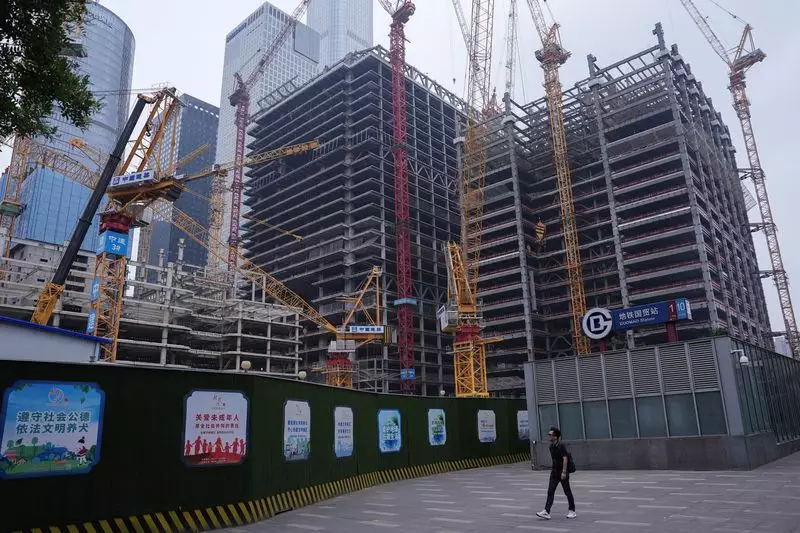In the wake of China’s recent economic woes, the government has signaled its intent to take bold steps to invigorate its faltering economy. At a recent press conference, Finance Minister Lan Foan outlined plans to enhance public debt levels significantly. This move aims to address a multitude of pressing economic issues, including local government debt management and low-income subsidies. However, the lack of specific numerical details about the stimulus package has left many investors in a state of uncertainty regarding the future trajectory of both the Chinese economy and the global markets.
The announcement arrives at a crucial time when key economic indicators have missed expectations, raising alarms among economists about the potential to meet the government’s growth target of approximately 5% for the year. The economic landscape is further complicated by a noticeable slowdown in consumer confidence, driven largely by a persistent downturn in the property market. Investors had been eagerly awaiting what they hoped would be a substantial fiscal stimulus to maintain the upward momentum of the Chinese stock market, which recently surged to a two-year high before retreating amid growing apprehension.
The response to the finance minister’s announcement has highlighted a sense of disappointment in the investment community. As Vasu Menon, managing director for investment strategy at OCBC in Singapore, observed, while the government expressed its commitment to economic improvement, the absence of detailed figures dampened the enthusiasm that had captured market players following the Politburo’s September meeting. This lack of clarity breeds apprehension about the sustainability of the stock market rally, potentially leading to increased volatility.
With China’s stock market experiencing a dramatic 25% spike in the days following the Politburo meeting, there was a palpable sense of optimism that additional monetary and fiscal measures would bolster economic activity. However, as the government remains tight-lipped on specifics, investors are once again faced with uncertainty. This has ramifications not only for domestic markets but also for global commodities, which are often influenced by Chinese demand.
Amidst this backdrop, the Chinese government has hinted at several potential financial maneuvers. Reports suggest that China plans to issue special sovereign bonds worth around 2 trillion yuan, aimed at alleviating the burden of local government debt and stimulating consumer spending. The proposal includes substantial financial support for the purchase of essential goods, aimed at softening the economic impact on families amid declining consumer confidence.
Furthermore, the government recognizes the pressing need to boost the capital of state banks to enhance lending capabilities. However, analysts caution that even with increased liquidity, the tepid demand for credit poses a challenge to effective implementation. This underscores a more profound issue within the Chinese economy: the reliance on debt-driven investments that are yielding diminishing returns.
The International Monetary Fund (IMF) has raised concerns about China’s burgeoning debt levels, noting that while central government debt stands at a manageable 24% of GDP, total public debt, including local government liabilities, swells to a staggering 116% of GDP. The comments by Lan Foan reflect an awareness of this issue, as he articulates a need for balancing fiscal strategies with a comprehensive approach to stimulate domestic consumption.
Despite acknowledging the necessity for further reforms, the government’s past track record in this area remains lackluster. For years, Chinese officials have pledged to enhance domestic consumption, yet progress has been minimal, suggesting that a fundamental shift in policy is essential to navigate the challenges ahead. Factors such as low wages, high youth unemployment, and a fragmented social safety net constrain household spending, which is significantly below the global average.
One of the critical takeaways from Lan Foan’s recent address is the acknowledgment of the pressing need to address local government debt risks while simultaneously leveraging unused funds. Municipalities are urged to repurchase unsold land, which may offer a temporary fix but does not resolve the underlying economic limitations.
As the central bank continues to implement measures in response to the economic situation, the trajectory leads towards an urgent need for structural reforms. The government’s commitment to address consumption and reduce over-reliance on infrastructure investment must transition from mere rhetoric to actionable plans. The forthcoming weeks will be crucial in shaping investor perceptions and guiding economic recovery strategies as China strives to navigate through its myriad economic challenges.
While the pledge to increase debt offers some reassurance amid growing economic pressures, it brings attention to the larger, unresolved issues that must be addressed if China is to achieve true economic stability and growth.

